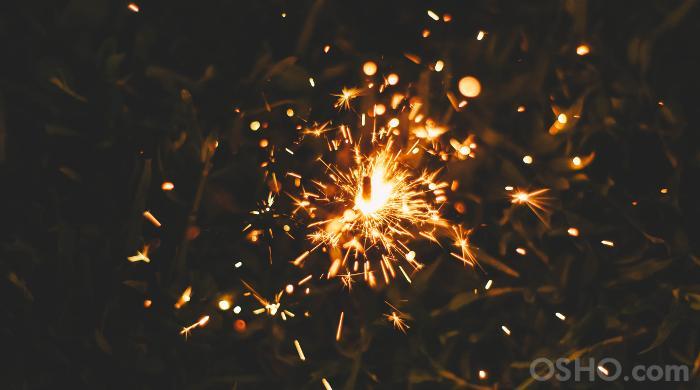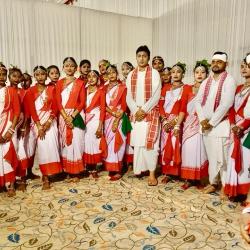Why do we become joyous on a particular day and why in every culture and society, there are a few days in the year for celebration? People think someday, in the future we are going to be happy, joyful, celebrating. Osho’s vision is that, if you want to be happy, joyful, celebrating, then nothing is lacking. Right now, this very moment, dance; laugh, this very moment. This moment is all there is; celebrate it. For Osho, life is all. What else is there, he asks? If one loses life and gains the whole world instead, what has one gained really? And if you gain your life and lose the whole world, nothing is lost.
Life is meant to be a celebration, not a contest, a competition. We need not be enemies here. If we function as enemies, then life becomes a hell. We make it a hell because we make it a conflict; we reduce it to violent struggle. Furthermore, the conflict is multi-dimensional: one nation against other nation, one religion against other religion, one caste against other caste, man against woman, rich against poor, one ideology against another ideology. It has become very complicated, hence it has lost the rhythm; it has lost the quality of song and dance.
Osho says, “every culture has to give some compensation to you so that you don't feel completely lost in misery. But these compensations are false. Firecrackers and lights outside cannot make you rejoice. They are only for children; for you, they are a nuisance. But in your inner world there can be a continuity of lights, songs, joys.”
“Society compensates you when it feels that the repression may explode into a dangerous situation if not compensated. But true celebration should come from and in your life; it cannot be according to the calendar.
Strange, the whole year you are miserable and on Deepavali suddenly you come out of misery, dancing. Either the misery was false or the date assigned for celebration is false; both cannot be true. And once the festival is gone, you are back in your dark hole, everybody in his misery, everybody in his anxiety.”
Life should be a continuous celebration, a festival of lights the whole year round. Only then one can blossom. To transform small things in life into celebration.
In Japan, they have tea ceremony. The act of drinking tea has been transformed into a celebration. The temple is made in a beautiful garden with a pond, with flowers all around. Guests have to leave their shoes outside. It is a temple. As one enters the temple, one cannot speak; and have to leave the very thoughts and speech outside with the shoes. While the guest sits down in a meditative posture, the host prepares tea in a special samovar which makes musical sounds. First everybody listens to the music of the tea, and sitting silently listen to birds chirping in the garden, and the samovar creating its own song. Peace surrounds. When the tea is ready and it is poured into the cup, one is not supposed to drink it straightaway. First one has to inhale the fragrance and then sip the tea as if it has come from the beyond, without any hurry. Somebody may start playing the flute. An ordinary thing as tea has been transformed into a beautiful religious festival, and everybody comes out of it nourished, fresh, feeling younger.
Celebration is without any cause. Celebration is simply because we are. We are made out of the stuff called celebration. That’s our natural state – to celebrate – as natural as it is for the trees to bloom, for birds to sing, for rivers to flow to the ocean. Celebration is a natural state. Celebration is not because some desire has been fulfilled because no desire can ever be fulfilled. Desire is only a way to avoid the present moment. When becoming disappears, all the smoke of becoming disappears, there is the flame of being, and that very flame is celebration.
Osho reminds us “Celebrate this moment. Life is not just for pleasure. Life is meant to find meaning. Doing something meaningful, doing something significant and creative, and that brings pleasure as a reward. Life should not be lived for a purpose; life should be lived as a celebration. Life should not be a business; it should not be just mundane. When one lives for no other reason except for the sheer joy of living it becomes a fulfilling experience - then it becomes a gift from the Divine. It gains a religious quality”
Osho’s observation is that, religion in the past has been very sad, serious, and that's why humanity could not become religious. If religion is going to remain serious and sad, says Osho, then only pathological people will become interested in it, ill people, sick people. If religion is serious and sad then only masochists and sadists become interested in it, because a sad religion is life-negative. It doesn't affirm life, it does not celebrate life.
“True celebration should come from your life, in your life. And true celebration cannot be according to the calendar, that on the first of November you will celebrate. Strange, the whole year you are miserable and on the first of November suddenly you come out of misery, dancing. Either, the misery is false, or the first of November is false; both cannot be true. And once the first of November has gone, you are back in your dark hole, everybody in his misery, everybody in his anxiety.
“Life should be a continual celebration, a festival of lights the whole year round. Only then can you grow up, can you blossom."
To be able to celebrate life is religion. In that very celebration one comes close to God. If one is able to celebrate, God is not far away; if one is not able to celebrate life, then God does not exist for him. God appears only in deep celebration.
We should be joyous and happy in this moment and need not worry about the future, need not be prophetic about the future. We should be joyous and happy in this moment, and the next moment will be coming out of this moment. It will be suffused with the celebration of this moment, and naturally it will lead you into a higher celebration. The future is going to come out of this present.
Celebration is not conditional on certain things. Whatsoever happens is irrelevant. It I not like ‘When I am happy then I will celebrate,’ or, ‘When I am unhappy I will not celebrate.’ Celebration is unconditional; unhappiness or happiness, celebration is an attitude, unconditional to what life brings.
Celebration is gratefulness for whatsoever life gives to you. For whatsoever existence has given us, showering on us; celebration is a gratitude; it is a gratefulness.”
Celebration is not entertainment, although we have been using these words synonymously. The greatest harm workaholics have done is that they have deprived life of its moments of celebration and festivity. It is because of them that there is so little festivity in the world, and every day it is becoming more and more dull and dreary and miserable.
Bringing out the difference between entertainment and celebration, Osho explains “In fact, entertainment has taken the place of celebration in the present world. But entertainment is quite different from celebration; entertainment and celebration are never the same. In celebration you are a participant; in entertainment you are only a spectator. In entertainment you watch others playing for you. So while celebration is active, entertainment is passive. In celebration you dance, while in entertainment you watch someone dancing, for which you pay him. But there is a world of difference between dancing and watching a dance performed by a group of professionals who are paid for it.”
Our celebration is the only true religion and anything that makes us festive, anything that gives us celebration, anything that makes us dance and sing to such an extent that we disappear in our dancing, in our singing, in our celebration is the only true religion.
- 9227 reads










Add new comment